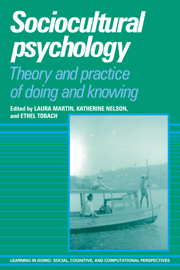1 - Introduction
Published online by Cambridge University Press: 05 November 2011
Summary
Scribner's historical moment in psychology, 1968–1991
The psychology that Sylvia Scribner entered from the New School for Social Research in the 1960s was a discipline newly emerging from the hegemony of learning theory and its antagonists in gestalt psychology, represented by her graduate mentor, Mary Henle. The 1960s cognitive revolution opened new doors to previously hidden landscapes; the study of mind and language were again seen as legitimate topics in psychology. Furthermore, the social and political forces of the time brought issues of schooling as a basis for educational opportunity to the forefront of national concerns. Thus Scribner's attraction to the problems of the relation of literacy, schooling, and thinking was initially in tune with the psychology of the times.
Cognitive psychology very shortly took a different turn, entering the 1970s with a fixation on the processing of information, the universal characteristics of the computational mind, and the innate basis of language and intelligence. From 1970 to 1985, concerns of cultural and contextual influences on the development of thinking skills, including issues of schooling and literacy moved to the periphery for mainstream psychologists, including developmental psychologists.
Scribner's own trajectory combined research on topics of contemporary concern to cognitive psychologists with a continuing emphasis on those issues that she viewed as most fundamental. For example, in the early 1970s she joined Michael Cole's Laboratory of Comparative Human Cognition at Rockefeller University and turned to studies of syllogistic reasoning and categorization among the Kpelle of West Africa. Her papers on these topics, which were of central interest to cognitive psychologists, became classics in the problem solving literature.
- Type
- Chapter
- Information
- Sociocultural PsychologyTheory and Practice of Doing and Knowing, pp. 1 - 18Publisher: Cambridge University PressPrint publication year: 1995
- 2
- Cited by

